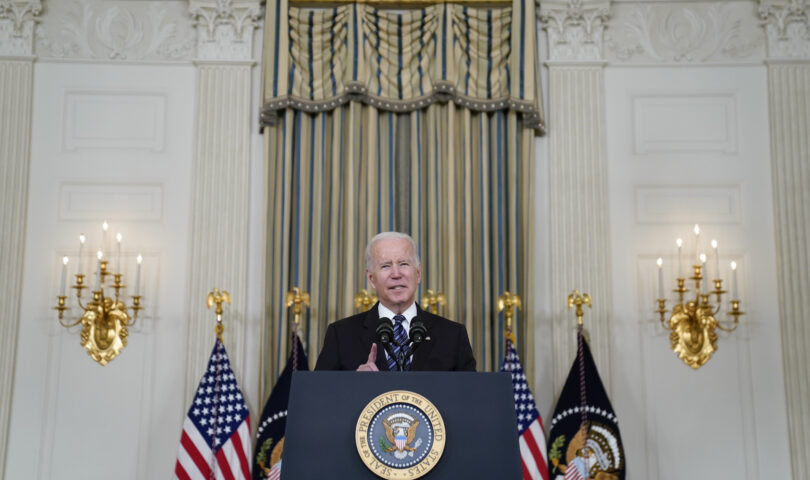MORGANTOWN — A federal judge Tuesday evening temporarily blocked the Biden administration vaccine mandate for health care workers employed by providers receiving Medicare and Medicaid funding.
Attorney General Patrick Morrisey, who was part of a 12-state coalition challenging the mandate issued by the Centers for Medicare and Medicaid Services, celebrated the ruling in a Tuesday-evening press release.
Contacted about the ruling Wednesday, WVU Medicine declined comment.
Mon Health System president and CEO David Goldberg shared a message he sent to system employees and provided some additional comments in a phone interview.
Morrisey said, “We are pleased that the court made a sensible decision and sided with individual freedoms for health care workers. Our group has successfully stopped this mandate from taking effect for the time being, and we believe the mandate will be struck down permanently moving forward. Such mandates threaten to further burden the health care sector and patient well-being in West Virginia, where a large percentage of nursing home and other long-term care facilities are already facing worker shortages.”
Goldberg told The Dominion Post, “It’s unprecedented times and I truly believe everybody is trying to do the right thing.”
When Mon Health System announced its vaccine requirement in August, the employee vaccination rates was 63%. Now it stands at 96.5%, he said.
So even through all the debate and federal and state actions and court challenges and rulings, he said, “We’ve come a long way. … As a result of our higher vaccination rate, we will maintain the long-term ability of our health care system to respond to the pandemic, safely care for our patients by protecting them from infection and mitigating the impact of the virus on patients, hospital colleagues and their families and friends.”
Goldberg said in his message to employees: “The ruling does not prohibit a facility from imposing a vaccine requirement as an individual organizational decision, much like has been done in the past with flu and pre-employment immunization requirements as examples. We are reviewing our COVID-19 immunization policy in light of the federal ruling and will communicate if there are any changes.”
The case was heard in the U.S. District Court for the Western District of Louisiana.
The court agreed with virtually all of the plaintiff states’ arguments in its 34-page ruling.
Among the highlights, the court said, “There is no question that mandating a vaccine to 10.3 million health care workers is something that should be done by Congress, not a government agency. It is not clear that even an Act of Congress mandating a vaccine would be constitutional. Certainly, CMS does not have this authority by a general authorization statue.”
The court also agreed that the mandate would harm Social Security recipients. “The plaintiff states maintain that although the purpose of the Social Security Act is to help health care patients, the CMS Mandate would have the opposite effect due to the loss of health care workers and funding to health care facilities. … Requiring COVID-19 vaccinations to health care workers covered by the mandate would hurt the patients the Social Security Act was meant to help.”
The court also agreed that the mandate was an arbitrary and capricious claim and violates the states’ police power.
“The plaintiff states will suffer irreparable injury by not being able to enforce their laws which have been preempted by the CMS mandate, by incurring the increased cost of training and of enforcing the CMS Mandate, and by having their police power encroached,” the court said. “The plaintiff states’ citizens will suffer irreparable injury by having a substantial burden placed on their liberty interests because they will have to choose between losing their jobs or taking the vaccine. Additionally, the health care facilities and suppliers will be burdened with the task of tracking and enforcing the mandate or else face the loss of Medicare and Medicaid funding.”
The court also commented on the mandate’s violation of separation of powers. “If the separation of powers meant anything to the Constitutional framers, it meant that the three necessary ingredients to deprive a person of liberty or property — the power to make rules, to enforce them, and to judge their violations — could never fall into the same hands. If the executive branch is allowed to usurp the power of the legislative branch to make laws, two of the three powers conferred by the Constitution would be in the same hands.”
The court noted that the case will be decided at a higher level: federal appeals court or the U.S. Supreme Court.
And while only 12 states filed the suit, the court made the injunction nationwide, excepting 10 states already under a similar injunction from a separate federal court ruling issued Monday.
Morrisey’s release said that according to CMS, the vaccine mandate targets about a quarter of the nation’s health care workers, who have chosen not to get vaccinated.
The Biden administration suffered a second vaccine-mandate setback Tuesday after a Kentucky-based federal court issued and injunction against Biden’s vaccine mandate for federal contractors in Kentucky, Ohio and Tennessee. Contractors in other states are required to be vaccinated by Dec. 8.
TWEET @dbeardtdp




